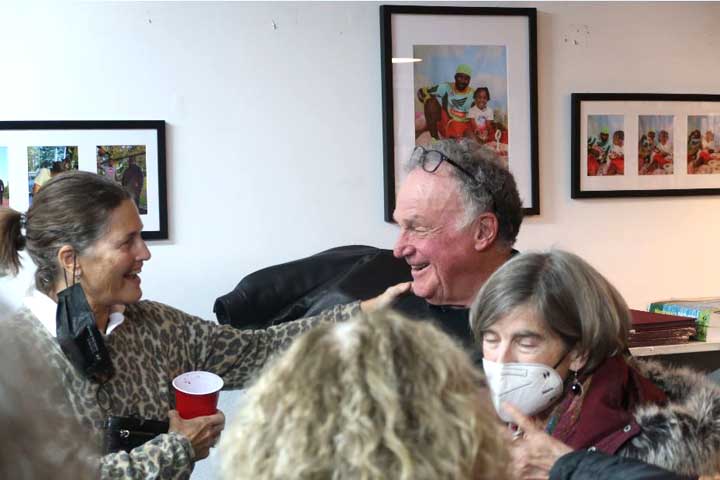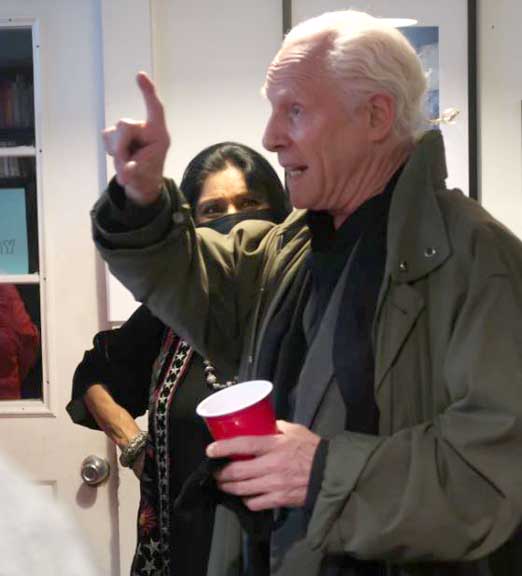Mark Goldman - Table of Contents
|
Partial reprint Mark
Goldman Wrote a New Book on Buffalo and This Time,
It's Personal
By RaChaCha Most
of
us would admit, if administered truth serum or enough beers,
that our relationship with Buffalo is love-hate. There are
things about this city that are profoundly disturbing and deeply
unjust: racism, segregation, dysfunction, and economic
injustice, to name a few.
While
all
that would make it easy to leave, and many have, others stay –
and even come here – convinced that Buffalo is worth investing
in and worth fighting for. Why? In part because, many of us have
found, there exists something ineffable about this place.
Experiences of places, people, and happenings here can burrow
deeply, past the psyche and into the soul, leaving an almost
religious impression. They can provide the elevation needed to
go back down into the trenches and fight for change.
Friday
evening’s
launch of Mark Goldman’s latest book, City of MY Heart,
was one of those
experiences. Ingredients included the unvarnished urbanism
of Fitz, music by the great
Moshe Shulman, and supernal catering by daaniela.
And filling the space to capacity were guests representing
decades of Buffalo leadership and change making.
His (S)toryBeing in that space where Mark recounted some key events in that involvement, with many of those who were compatriots in those events, felt a bit like being in a time machine. It was a chance to get a firsthand glimpse into key moments in Buffalo’s modern history that I’d heard about but wasn’t here to witness. Mark came here from New York City at that magic moment when an expansive governor’s investment in SUNY at Buffalo gave the school the nickname, “Berkeley of the East.” Pursuing a Ph.D. in history, he initially wanted to write about the Italian hill towns he’d fallen in love with, with their intact civic fabric and neighborhood culture. Then he discovered he could find something of that remaining in Buffalo. So he wrote his dissertation on the Black Rock neighborhood, a place which I can attest – after a half-decade of intensive research on the Scajaquada corridor – is Buffalo’s most endlessly engaging and fascinating urban village. But as engaging as Mark found parts of the city, overall it was clearly in decline. He talked of shabby civic infrastructure like Delaware Park, where cars drove onto the ring road from the expressway. And just as lacking was the civil society infrastructure needed to fight the decline.  So,
as
Mark described it, a group of runners who ran in Delaware Park,
along with others like Joan Bozer, Joanie Kahn, and Frank
Kowsky got together to advocate for the Delaware Park, the
genesis of what became the Olmsted Conservancy. Dr. Kowsky would
go on to be a nationally recognized Olmsted scholar, Joan Bozer
would co-found the National Association of Olmsted Parks, and,
along with Joanie Kahn, would co-chair 21st Century Park on the
Outer Harbor.
One
of
Mark’s fellow runners was Judge Curtin, who oversaw the school
desegregation case that became the centerpiece for Mark’s book,
City on the Lake. His
deep respect for Curtin, who passed away four years ago, was
evident as he became emotional talking about him.
 But
if
there was a centerpiece of Mark’s talk – and, he might agree,
his contribution to Buffalo’s renewal – it was the Calumet
Arts Café. The Calumet was a gutsy move that began the
dramatic shift in the, um, entertainment offerings on Chippewa.
The dialog between Mark and Vincent O’Neill about how they took
a risk on each other was a great bit of improvised theater. The
Calumet was also home to "Bread and Onions," which kept the
flame for a neighborhood wiped away by “urban renewal.”
But
my
favorite part was Mark’s remarks about battles he’s fought over
civic projects like Bass Pro, the Commercial
Slip, and the Gorski convention center proposal. His guide
star on such issues, he told us, is the “Grandma Rosie”
principle. Most families, Mark posits, have someone with great
common sense and accumulated wisdom like his own Grandma Rosie.
Such simple sagacity should steer us to sensible solutions on
civic issues. Mark recounted how he applied this literally,
starting a conversation with Larry Quinn about Bass Pro by
asking him, “What would your grandmother think of this project?”
Larry admitted that his grandmother might not have been on board
with it.
 I
bet Grandma Rosie would have approved.
The
Arc and the Covenant
|

web site consulting by ingenious, inc.